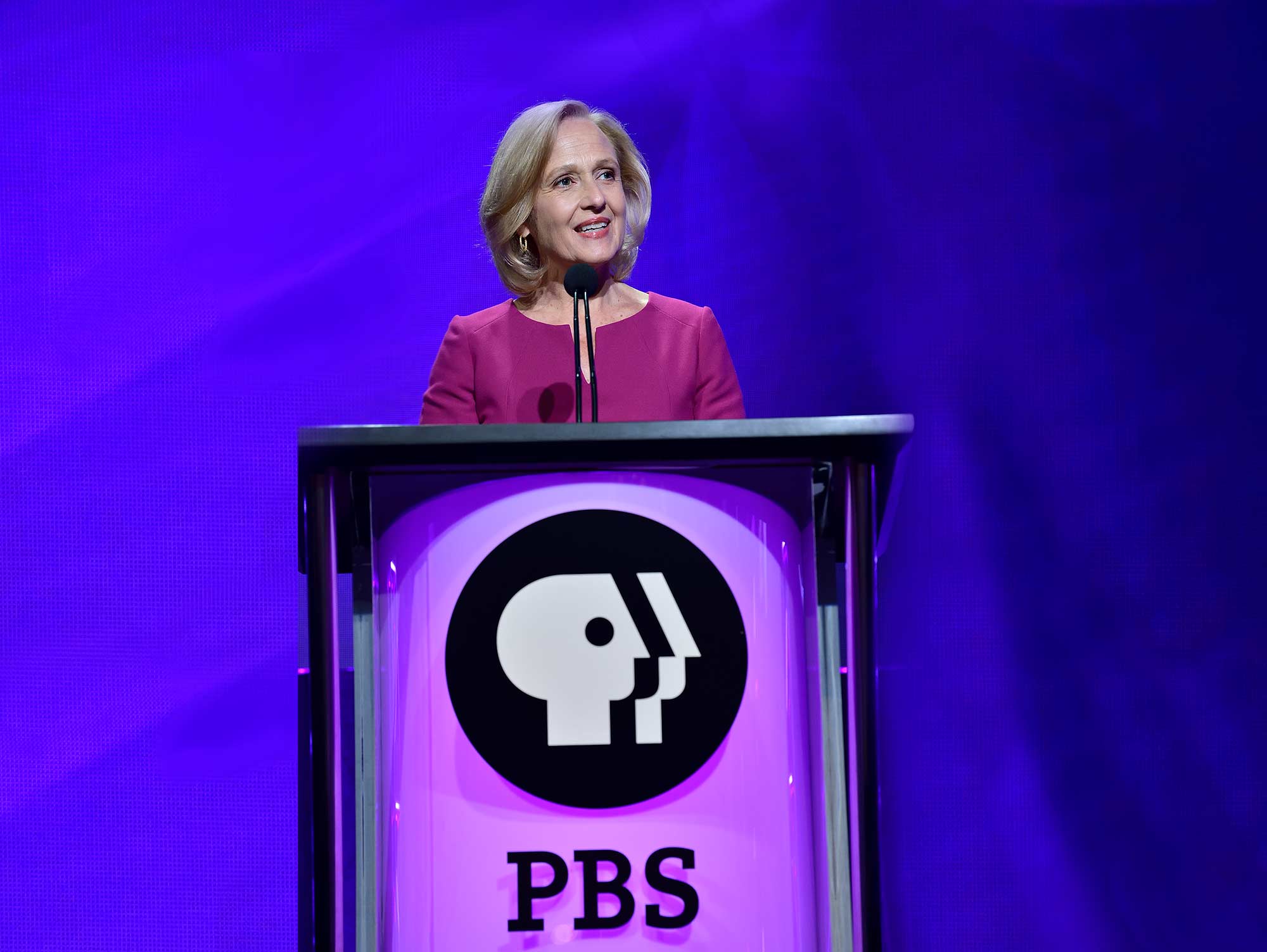
Photo courtesy of PBS
Reflections from the Road: Community Matters
By Paula Kerger
I fly a lot for my job. My travels have taken me from Juneau, Alaska, to Cookeville, Tennessee, and many places in between that lie far from an airline hub.
My life on the road is tied to the fact that the heart of public television beats through communities across America. Unlike television networks, PBS is a system of nearly 350 member stations – stations that are accountable to the citizens who live, work and raise families in the communities they serve.
One added benefit of visiting with stations is that it helps me gain insights that I can’t get from sitting in my office. As I’ve crisscrossed the country for PBS, I have observed a troubling trend. We may share the same zip code or grocery store, but for the most part, Americans are not talking to each other, and the very fabric that binds communities together is fraying.
The New York Times columnist and regular contributor to the PBS NewsHour, David Brooks, has written about what he terms a “crisis of community,” in which a culture of individualism has led to Americans becoming increasingly isolated and disconnected. This goes hand-in-hand with a steep erosion of trust in traditional institutions.
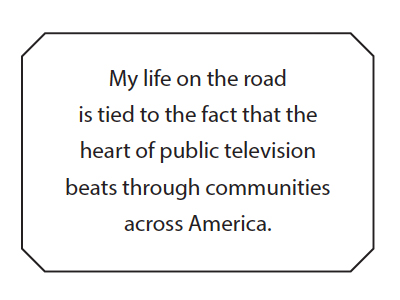
As people move to their respective corners and choose not to engage, America loses its momentum, and we lose our ability to focus on the most pressing issues facing our society. This represents nothing less than an existential threat to our democracy, the health of which depends on an informed and engaged citizenry.
No matter the field you represent – whether you hail from business or government, philanthropy or media – every leader has a stake in building communities and restoring the public’s trust.
So where do we go from here?
Now more than ever, we must reaffirm that there is more that unites us than divides us. I strongly believe that the answer lies in the community. And there are lessons from public media that can inform the path forward.
Think Local
Many traits distinguish public media from commercial media – our educational mission, our near-universal broadcast reach – but none is more powerful than our local presence. In many places, public television and radio stations are the last locally owned, operated and governed broadcasters.
While PBS member stations share a mission to educate, inspire and entertain, each one tailors its services to meet the unique needs of its community – whether it’s Alaska Public Media providing customized resources to educators, or North Carolina’s UNC-TV working with state and local officials to bolster statewide emergency alerting. Each station is committed to telling the story of their community as only a local organization is capable and positioned to do.
By demonstrating a long-term, vested interest in communities, we’ve built up a significant reservoir of goodwill and support with our audiences. This year, for the 15th consecutive year, PBS and local stations were rated the most trusted public institutions in America.
Through my travels, I’ve been inspired by the extraordinary work happening across sectors – from business leaders in Michigan who are investing in neighborhood initiatives to improve educational outcomes, to focused efforts to invest in journalists in towns across America to report on local issues.
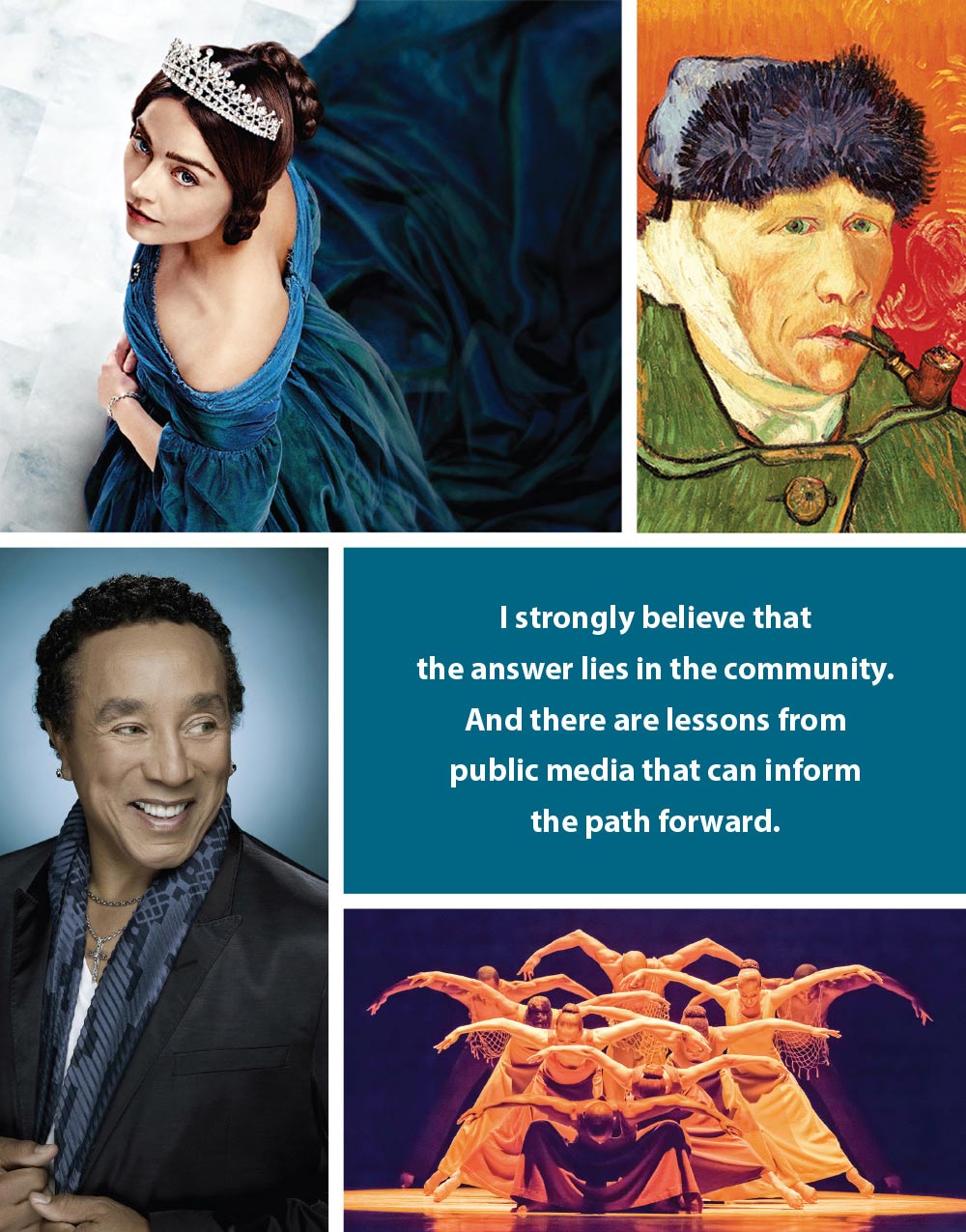
Clockwise from top left to bottom left:
Victoria, courtesy of © ITV plc (ITV Global Entertainment Ltd); Secrets of the Dead: Van Gogh’s Ear, courtesy of private collection/Bridgeman Images; Alvin Ailey’s Revelations, courtesy of Gert Krautbauer; Smokey Robinson, courtesy of Nick Spanos.
Create Face-to-Face Experiences
According to the Pew Research Center, fewer than half of Americans talk face-to-face with their neighbors. At the same time, people are moving away from participating in activities that have traditionally brought us together, such as attending local government meetings and religious services. Increasingly, our interaction is moving online.
While social media can be a wonderful point of connection, it also can drive people farther apart. Digital platforms create algorithms that push us into camps of like-mindedness, which only deepens the growing divide.
We need more opportunities that bring people together for face-to-face conversation.
WGVU, LZ Michigan, September, 2017
I recently visited with South Dakota Public Broadcasting for the opening of their Black Hills Bureau in Rapid City. The new bureau, which is housed in an old auto parts building, is a hub for storytelling and reporting in the western part of the state. The building also serves as a gathering space for local residents.
The ribbon cutting for the new bureau featured a community discussion on media. When I looked across the room, I was profoundly moved by the attendees – retirees, farmers, moms who had just dropped their kids off at school – all coming together to talk about the role of media in fostering a civil society.
People are eager to participate in conversations that move their community forward. Sometimes, all you have to do is ask.
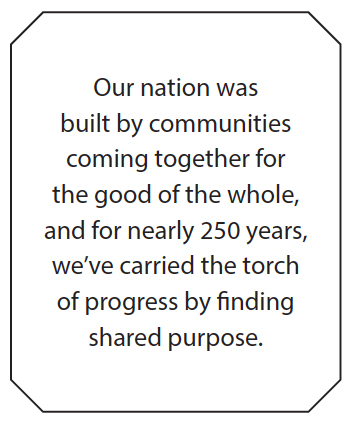
A screening of Ken Burns’ documentary The Vietnam War at Chandler Public Library (2017).
Find Common Ground
In this divisive era, it is often assumed that some topics are too sensitive or too fraught with tension for civil dialogue. However, most people are willing to reach across our invisible dividing lines. According to a recent survey by Weber Shandwick, the public is nearly unanimous in believing that civility is vital to our democracy, with more than 95 percent of Democrats and Republicans agreeing.
I’ve seen that it is possible to find common ground on even the most challenging of subjects. PBS member stations gathered communities for discussions around shootings in Newtown and Charleston, held conversations on race and justice in Ferguson, and brought veterans together with peace activists to reflect on the Vietnam War in conjunction with Ken Burns’ landmark documentary.
Polarization and division do not have to be the new normal. We must create more spaces where people can participate in civil dialogue without the toxicity that dominates today’s airwaves.
No matter our differences, it is clear that Americans share similar hopes and dreams for the future. Our nation was built by communities coming together for the good of the whole, and for nearly 250 years, we’ve carried the torch of progress by finding shared purpose. As leaders, we have a responsibility to help rebuild and restore communities. The very survival of our democracy depends on it.
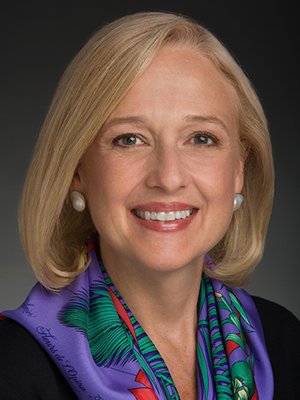
Paula A. Kerger is President and Chief Executive Officer of PBS, the nation’s largest non-commercial media organization with nearly 350 member stations throughout the country. Having joined PBS in March 2006, Kerger is the longest-serving President and CEO in PBS history. Under Kerger’s leadership, PBS has grown its audiences across genres and platforms. PBS moved from the 15th most-watched network in America to number six in the past decade.
Paula A. Kerger
President and CEO
PBS